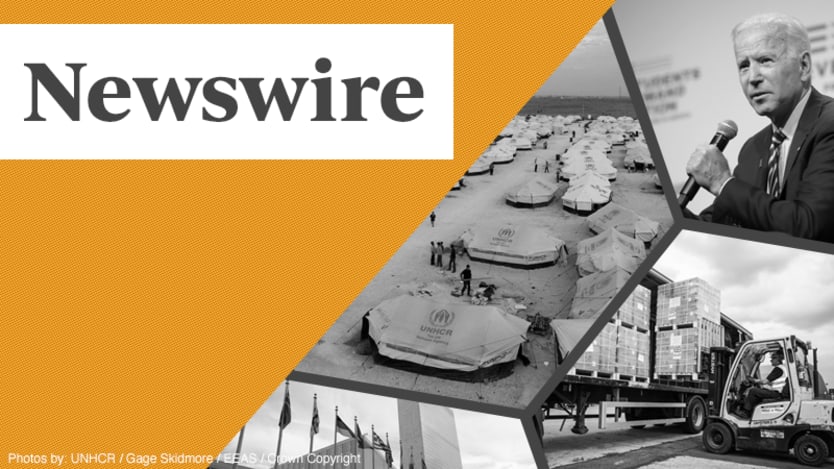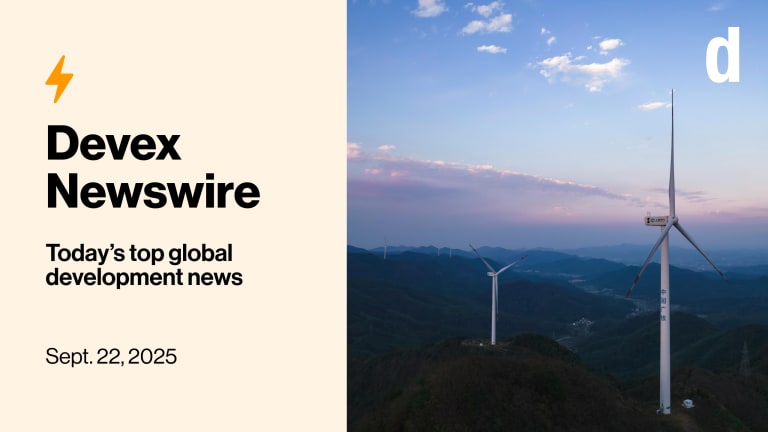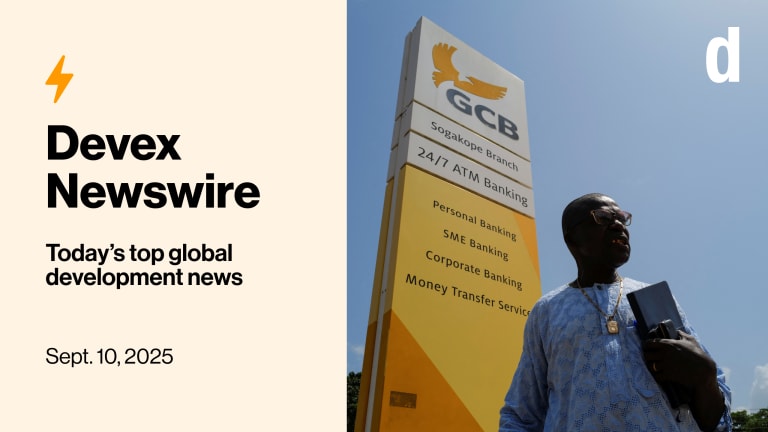Presented by Data.org

The excitement of the United Nations General Assembly is all but over, but we take a last look at the highs and lows of the event and examine how the narrative was drawn toward the interests of the global north — Russia’s invasion of Ukraine — and away from the global south.
This is a preview of Newswire
Sign up to this newsletter for an inside look at the biggest stories in global development, in your inbox daily.
Also in today’s edition: Cindy McCain and Alvaro Lario argue that food security is national security, and we discuss funding for loss and damage for climate disasters with a Filipino activist.
Anger and alienation at UNGA
As per usual for UNGA, the media focus is on the U.S. president, a couple of European leaders, and a token evildoer or two. This year, the evildoers were fewer, but the spotlight homed on Joe Biden, Ukraine’s Volodymyr Zelenskyy, and the absent Russian President Vladimir Putin.
But that was not what many wanted to discuss. These are unprecedented times, and although many of the world’s current problems stem from the actions of one of the three gentlemen above, we can’t blame him for the devastating floods in Pakistan, drought in sub-Saharan Africa, and sickness just about everywhere.
Leaders from the global south made impassioned speeches from the podium that “veered away from the U.S. script,” writes my colleague Colum Lynch.
He noted a tone of resentment toward their wealthy, northern neighbors. The U.S. and Europe want global support in the fight against Russia but leave struggling nations forsaken after promises to address numerous existential crises.
Pakistan’s Prime Minister Shahbaz Sharif, clearly distressed by the floods at home, railed against polluting nations, saying, “the undeniable truth is that this calamity has not been triggered by anything we have done.” Pakistan is one of 10 countries most vulnerable to climate change but has generated less than 1% of global emissions, he argued.
The triple crises of the pandemic, climate-induced drought and famine, and a war that left inflation “supercharged” have exacerbated traditional tensions between the global north and global south, writes Colum.
It has also fueled a sense of alienation from high-income nations among lower-income nations, which have seen a raft of commitments on sustainable development goals — to end poverty and hunger and make vaccines available to low- and middle-income nations — fall well short of expectations.
Read: UNGA cast a spotlight on split between global south and north
Related: Devex Pro members can get funding insights on who’s given aid to Pakistan after the flood. Not gone Pro yet? Read the piece by starting your 15-day free trial.
Catch up: Here’s all our UNGA 77 coverage
Rory and peace
I wonder what Rory Stewart thinks now. Just days before the United Kingdom surprised the world by offering a £0.00 pledge to fund fighting deadly diseases, he warned that recent aid cuts had put the British government’s relationship with Africa on “borrowed time.”
“If it continues much longer, [the U.K.] will lose its position in Africa very rapidly. And that's heartbreaking,” Stewart, chief executive of Give Directly, told my colleague Will Worley.
Well, time may be up now. Mouths were agape on Wednesday when the U.K., which had helped establish the fund 20 years ago, donated nothing at all to the Global Fund to Fight AIDS, Tuberculosis and Malaria — three diseases that particularly hurt African nations. The Global Fund raised $14.25 billion, well shy of its $18 billion target.
Read: UK 'on borrowed time' in Africa since aid cuts, says Rory Stewart
Learn more: How King Charles III’s reign might influence UK development (Pro)
Check out: We have a U.K. aid page for the latest news and analysis of the sector.
Pill, baby, pill
And this is where the fund makes the difference. Pfizer and the Global Fund signed an agreement last week to buy up to six million doses of Paxlovid, the oral COVID-19 antiviral drug. The treatment is aimed at 132 low- and middle-income countries, many of which haven’t accessed the drug despite a strong World Health Organization recommendation in April for it to be given to patients with mild to moderate COVID-19, who are at the highest risk of hospitalization.
Read: Pfizer, Global Fund agree on Paxlovid supply
New perspective
If there’s a silver lining to the dismal food crisis, it’s that world governments are being forced to wise up about food security and treat it as an aspect of national security — at least according to Cindy McCain, U.S. ambassador to the U.N. agencies for food and agriculture, and Alvaro Lario, incoming president of the International Fund for Agricultural Development.
“In my meetings with some heads of state — African heads of state — it's becoming a national security issue,” Lario told my colleague Teresa Welsh last week.
McCain looked to the border, noting that when migrants cross “they’re hungry,” but the effect on border and middle states makes it a national security issue, she said.
As a self-described “heinous Chihuahua” that barks and bites, she may be just the person to spread the message.
Watch: Navigating a worsening global food crisis
+ Sign up to Devex Dish, our free, must-read Wednesday newsletter about the global food system transformation.
‘We’re just losing lives’
In the latest episode from our new podcast series “UNGA Decoded,” Kate Warren talks with Marinel Sumook Ubaldo, a Filipino climate activist who channeled her firsthand experience of climate-related disaster into youth advocacy.
As we gear up for the 27th U.N. Climate Change Conference, or COP 27, in Egypt later this year, Ubaldo expects the conversation to turn, again, to funding for low-income countries most hurt by climate issues — and specifically to funding for loss and damage, which she says was promised during COP 26 in Glasgow. Last week, Denmark made a $13 million pledge to fund loss and damage from climate change in low-income countries — the first time a high-income country has made such a commitment.
“We cannot adapt anymore, we’re just losing lives, we’re just losing livelihoods, we’re just losing our communities,” Ubaldo says.
Listen: Marinel Sumook Ubaldo on climate loss and hope
+ If you missed any of the podcast episodes, you can listen to them through Apple Podcasts, Spotify, SoundCloud, or YouTube.
In other news
The number of people infected by a rare strain of Ebola in Uganda has risen to 16, as the disease has now been found in three other districts. [Reuters]
Experts and corporate executives warn of the significant consequences for Myanmar citizens' access to foreign aid if the Financial Action Task Force places the country on an international anti-money laundering blacklist. [Nikkei]
World Bank President David Malpass has denied he will resign from his post following backlash over his answer when asked if he believed human activity caused climate change. [The Associated Press]
Sign up to Newswire for an inside look at the biggest stories in global development.








